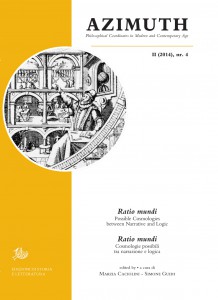 Azimuth 4/2014 | Ratio Mundi. Possible Cosmologies Between Narrative and Logic
Azimuth 4/2014 | Ratio Mundi. Possible Cosmologies Between Narrative and Logic
Edited by Marzia Caciolini e Simone Guidi
ISBN: 9788863727111
Buy Azimuth on Amazon | Buy Azimuth on IBS | Buy Azimuth on Libreriauniversitaria
The issue addresses the relationship between cosmology and ratio, or the dialectical and structural connection which links the same definition of “world” as an uniform, homogeneous, coherent and possible system with the very logical and narrative (and then uniform, homogeneous, coherent and possible) character of our rational description of it. Otherwise, every ratio mundi – understood both in a metaphysical or in an epistemological or in a phenomenological way – amounts, really because it is a ratio, as an explication and an articulation of an object formerly preunderstood and, so to speak, invented, cum discursu, or rather into specific logic and descriptive categories. Because of this structural co-belonging of the concept of “cosmos” to his own narrative dimension, we may can reduce the history of cosmology to a long sequence of depictions, but overall of creations and re-creations of the world, that allow us to distinguish in a only partial way a physical and naturalistic discussion from a theological, a metaphysical or a linguistical-imaginative one.
Contents:
- Preliminary Notes
- Yaël Nazé, Structure de l’univers. Quand l’observation guide la théorie… ou pas
- Jonathan Regier, A Perfect Knowledge is a Finite World
- Michel Blay, Copernic est-il copernicien?
- Nunzio Allocca, La luna e il libro della natura. Su Italo Calvino e l’eredità di Galileo
- Simone Guidi, La favola della materia. Epistemologia e narrazione nel Monde di Descartes
- Martine Pécharman, L’idée du temps, et le temps universel chez Pascal
- Bruno Leclerq – François Dubuisson, Le monde tient ses formes du langage. Wittgenstein et le tournant linguistique imprimée à la Critique de la Raison Pure.
